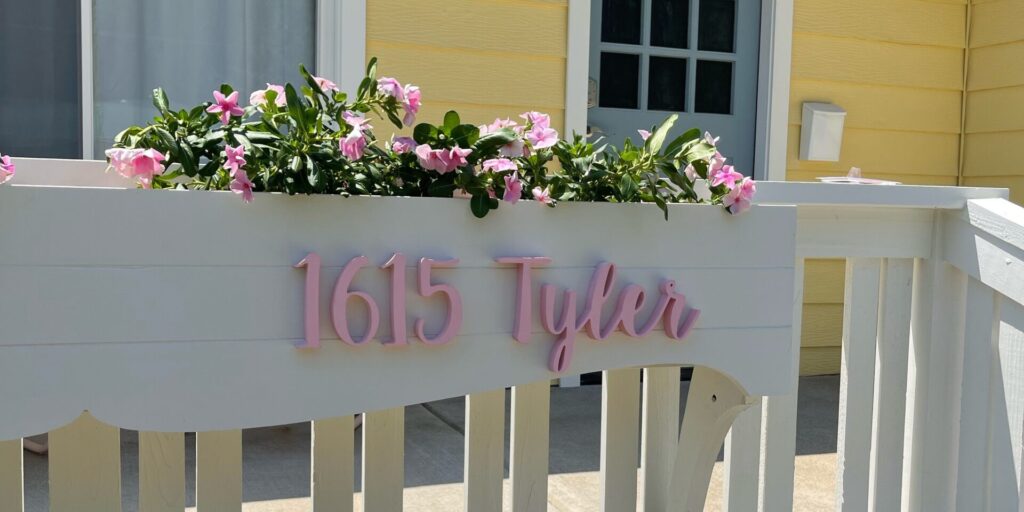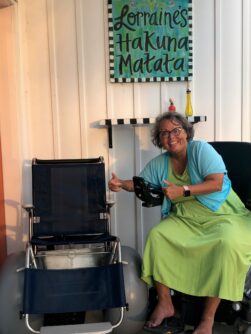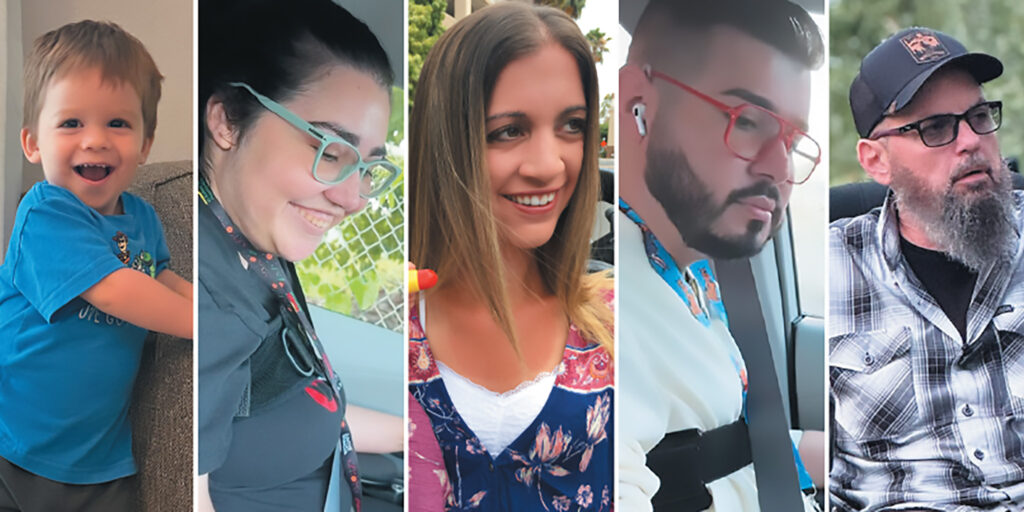
Expedia’s New Initiative is Transforming Accessibility for Short-Term Rentals
By Rebecca Hume | Friday, July 11, 2025

Lorraine Woodward, founder and CEO of Becoming rentABLE.
Expedia Group is not only opening the door, but widening the doorway, when it comes to accessible short-term rentals (STR) and vacation homes. As one of the largest travel companies in the world, hosting travel metasearch engines like Vrbo, Tavelocity, and more, the initiative to increase accessible options has the potential to transform accessibility in the STR industry.
The initiative aims not only to increase search features for potential travelers living with disabilities, but also to empower and educate hosts with actionable tools. In order to increase their understanding of the myriad of accessibility needs of those living with disabilities and how to equip hosts to best meet those needs, Expedia teamed up with accessible STR experts, Becoming rentABLE.
“As with any effort focused on creating change, this collaboration has taken a lot of planning to come to fruition,” says Lorraine Woodward, founder and CEO of Becoming rentABLE. “It’s not just a win for inclusion—it’s a major shift in how accessibility is defined and implemented in the travel industry.”
Creating and providing access to rentABLE vacation homes
Becoming rentABLE initially developed and grew from the challenges that Lorraine and her own family experienced when attempting to find an accessible vacation home. Lorraine and her two sons live with muscular dystrophy, which made traveling difficult due to the small supply of accessible STRs and the limitations in accessibility features and filters on online listings. Wanting a place that her sons could enjoy time with friends and family, creating lasting memories without barriers, but unable to find that on existing vacation search engines – Lorraine took matters into her own hands.
“We ended up buying and building an accessible place for our family, using our needs as the basis for creating accessibility there,” she says. “We really looked at something for someone with limited abilities and installed an elevator, roll-in-shower, roll under kitchen cabinets, accessible mirrors, wide doorways, and other features. We created a safe space where the boys and their friends could gather, look at the ocean, enjoy the beauty of nature, and enjoy time together. To me, that was really important as I looked at their growth and the opportunities that I wanted them to have.”

The Woodward family enjoying time at the beach while staying their renovated, accessible home.
Lorraine wanted other families to have those same opportunities. Well aware of the need for accessible STRs, her family decided to make their own vacation home available to others. Now, ten years later, over 450 families have stayed at their beach house.
Since then, the Woodwards have renovated a second accessible property in her hometown area of Arkansas and created Becoming rentABLE, an online platform that serves as a hub for hosts to certify and list their accessible properties. The site allows travelers living with disabilities to more easily filter and search for a vacation home that will meet their specific accessibility needs.
“Accessibility is not about a checklist that these 10 things equal accessibility for everyone, it is really about choices,” Lorraine says. “When we developed Becoming rentABLE, it was about a filtering choices. We have 43 mobility filters and 20 cognitive filters. We look at the broadness of what accessibility means and what are the varying needs. What we found in our research is that finding an accessible place to stay is hard because there aren’t filters across the board with details. We wanted to create a clearing house and listing platform that you could go to that listed only verified, accessible short-term rentals and with clear filters.”
Expanding accessibility with Expedia
Through their new initiative, Expedia it is now the first global STR platform to expand accessibility filters beyond “wheelchair accessible” and “elevator”. Recognizing the diversity of travel needs through collaboration with companies like Becoming rentABLE, Expedia has added options for cane, walker, crutches, hearing, and vision needs. New filters also include:
- Stair-free path to entrance
- Single-level property
- Accessible parking
- Accessible pool
- Accessible path of travel
- Entrance ramp
- Handrail in stairway or hallway
- Accessible van parking

At her STR vacation home, Lorraine provides guests with a beach wheelchair to access fun in the sun.
“It’s really about providing that information so that the renter can choose what they need to select a property to meet their needs,” Lorraine says. “So much of what we are doing is not that one thing is right or wrong. For example, thinking of me, I would say having a bathtub is not accessible, but I have so many friends that are paraplegic who would prefer a tub over a shower. And you go into sensory and autism, tubs play an important role in soothing and calming. The more information you give the better the experience you can provide, with more filters you can customize your experience.”
The initiative goes beyond increasing options and choices for the customer though. In order to achieve systemic change in the STR industry, it’s imperative to provide education and tools to the hosts of properties. By tapping into the needs of travelers with disabilities, Expedia is providing an opportunity for hosts to not only serve an under-served population, but also to access an untapped market.
Increased understanding equals increased access
The educational aspect of reaching hosts to increase their understanding of accessibility needs is paramount in reshaping the landscape of travel for those living with disabilities. Lorraine shares that through the collaboration, they created invaluable educational materials targeted at hosts and managers in order to share and increase the broadness of what accessibility means.
“The initiative is launching with an education-first approach, featuring authentic imagery representing real disability experiences—from youth in wheelchairs to seniors with walkers and individuals with guide dogs,” Lorraine says. “Most importantly, we’re equipping hosts with actionable tools—including our new infographic with more than 50 specific accessibility features found in STR properties.”
Becoming rentABLE created and wrote all of the initiative’s educational modules. Consulting on imagery and weighing in on the accuracy of a depiction of a hoyer lift or the efficacy of grab bar placement, Lorraine and her team ensured that the content provided to hosts would truly encompass the needs of those in the community.
“Expedia understood the value of education and the role that education plays in looking at the broadness of accessibility. No other company has taken that approach to bring about change for accessible STR,” Lorraine says. “That is really the significance. If we want to grow accessible lodging options globally and within North America, we have to provide education and understanding to what that means – and how it is an untapped market. It is about understanding and recognizing that we all have different needs and identifying those needs that give us opportunities to travel.”
Partnering for change
Currently there are around 1,000 properties in the United States that are listed as accessible to travelers with disabilities, a number that Lorraine is motivated to change through her commitment to increasing inclusion and opportunities to travel for those living with a disability. Becoming rentABLE’s partnership with Expedia in their first-of-its kind initiative is a monumental step towards that goal.
“There should be 1000 accessible properties in every city, not 1000 properties across the whole country. But you can’t get there without providing education to hosts and increasing their understanding of what makes an accessible short-term rental,” Lorraine says. “What we are doing now with Expedia is helping to move that needle in understanding what an accessible property is – and expanding the STR market for those living with disabilities.”

A graphic guide designed by Becoming rentABLE and Expedia to educate STR hosts on accessibility.
Next Steps and Useful Resources
- Stay up-to-date on Quest content! Subscribe to Quest Magazine and Newsletter.
Disclaimer: No content on this site should ever be used as a substitute for direct medical advice from your doctor or other qualified clinician.




